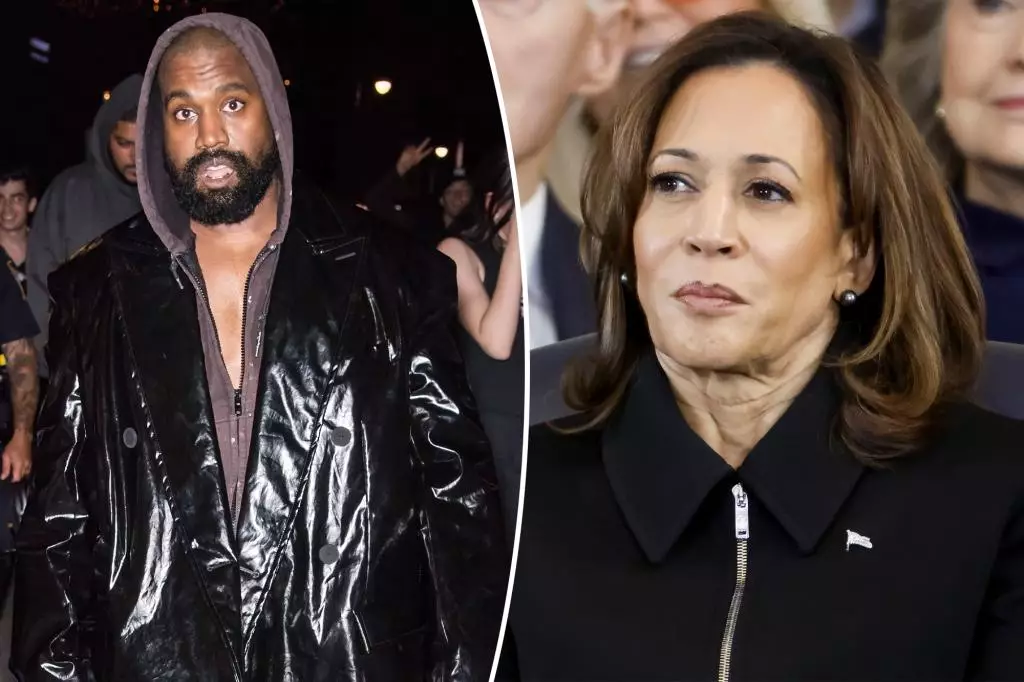Kanye West, a cultural icon and polarizing figure, has generated yet another wave of controversy with his recent social media activity. Known for his candidness and unrehearsed remarks, West took to X (formerly Twitter) to express disdainful thoughts about former Vice President Kamala Harris, which led to an apology that encapsulated his erratic behavior. This incident not only reflects West’s unfiltered persona but also raises questions about the societal implications of celebrity culture and the responsibilities that public figures carry.
West’s initial tweet was provocative, flaunting sexualized sentiments toward Harris. It depicted a rather crude view, stating, “I used to want to f–k Kamala until she lost. I don’t f–k losers anymore.” Such language is odious, especially when directed toward a public figure. However, following the backlash, he modified his tone with an apology—a somewhat predictable maneuver of modern celebrity culture, wherein individuals crave both attention and validation, often leading to rapid-fire apologies when faced with public disdain.
The dual nature of his posts serves as a public relations dilemma. While West’s intent may have been to entertain his followers, the ramifications are significant. His subsequent tweet emphasized that Democrats “don’t control black people no more,” indicating a dangerous rhetoric that simplifies complex sociopolitical dialogues into jarring one-liners. This leads to a troubling narrative, one that intertwines race, politics, and personal celebrity status in a volatile mix. The need for entertainers to maintain a brand amid stormy waters often culminates in their reckoning with the very culture they help shape.
Celebrity Missteps and Their Societal Impact
Kanye West is no stranger to controversy. His history of public missteps includes a 2022 ban on X due to anti-Semitic rhetoric. His tendency to vocalize unfiltered thoughts not only impacts his own reputation but also reverberates through broader societal conversations regarding freedom of speech and the power dynamics within celebrity influence. His remarks regarding Harris may mirror deeper societal issues of misogyny and the sexualization of women in political realms.
The superficiality in West’s claims—wherein his admiration detracts after perceived failure—also serves to highlight a gendered agenda, as it betrays a cultural tendency to reduce women to their professional success or failures in a male-dominated landscape. This cyclical dismissal of female politicians as “losers” based on their electoral outcomes deserves scrutiny and must not go unchallenged.
Clashing with Taylor Swift: An Ongoing Saga
In the tapestry of West’s public life, his long-standing feud with Taylor Swift continues to offer a glimpse into the chaotic coexistence of art, rivalry, and personal grievances. The singer-songwriter’s ascendance to pop royalty experienced its earliest turbulence during the infamous 2009 MTV VMA incident, where West’s interruption marked the genesis of a fraught relationship that has seen various phases of conflict and pseudo-reconciliation.
Their rivalry exemplifies how celebrities navigate public perceptions of power and femininity within the cultural sphere. As both artists prepare for the upcoming Grammys, the buzz revisits their complicated histories and public personas—underscoring how music and celebrity are often sullied by personal vendettas played out on social platforms. The anticipation of their potential crossover at events like the Grammys brings forth excitement, yet it also reflects society’s hunger for drama steeped in history and unresolved tension.
Kanye West’s recent remarks paint a vivid yet controversial portrait of celebrity culture’s intersection with politics and gender. As he oscillates between provocateur and contrite artist, it poses crucial questions about equality, responsibility, and the humanity hidden beneath the gossip and headlines. The public persona that West curates reveals broader societal tensions regarding race, gender, and the complexities of the modern celebrity.
As we observe these interactions unfold within the public sphere, it serves as a reminder that with great visibility comes great responsibility; that the narratives we spin in the public eye cannot be divorced from their larger implications in society. The discourse around figures like Kanye West is not merely entertainment; it is a reflection of the broader cultural conversations surrounding fame and accountability, ones that are critical to engage in as society evolves.

